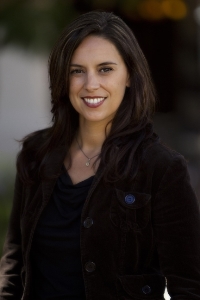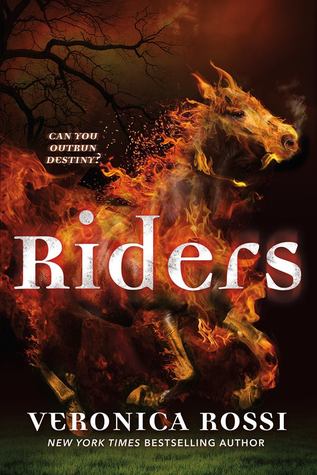2018 School Spending Survey Report
Interview: Veronica Rossi on Her YA Crossover Series Opener, "Riders"
New York Times bestselling YA author Veronica Rossi chats with SLJ about her inspiration for Riders, her latest focusing on the four teen Horsemen of the Apocalypse and their quest to save the world from destruction.

Photo courtesy of Tor Teen.
Following up her New York Times best-selling "Under the Never Sky" trilogy (HarperCollins), Veronica Rossi's newest fantasy duology opens with Riders (Tor Teen, Feb. 16, 2016). Gideon Blake, 18, is still grieving the death of his father and working to become a U.S. Army Ranger when he suffers a fatal accident during training. Yet instead of dying, he wakes up with a weird cuff on his wrist and strange powers. Here SLJ chats with Rossi about this crossover title focusing on the four teen horsemen of the apocalypse and their quest to save the world from destruction. This genre-bending tale is quite a departure from your previous series. What inspired you to write it? Yes, it is different! Still, I think readers who relish a blend of action, romance, and humor will see those elements present in Riders, too. That’s what I love as a reader—so it’s where I tend to go as a writer as well. It’s difficult to pinpoint a single source of inspiration, so I’ll name a few. First, I’ve always been a fan of military books and films. About five years ago I read Fearless (Waterbrook Pr., 2012), a biography of a Navy SEAL named Adam Brown, which really moved me. At that moment I knew I needed to write about a soldier. My idea to incorporate the four horsemen was both a feeling of wanting to know more about the subject and wishing to confront a fear. If something terrifies me, I become a little obsessed; I want to understand it and look it right in the eye. The four horsemen fell into that category. Finally, along the same lines, I have to feel that prickle of anxiety when I’m creating new book ideas. If it sounds impossible, that usually means it's something worth exploring. Weird, I know. Riders is a story I had to write, even if it was just for me. You’ve created a complex cast of characters, each member with a very different personality and background. How did you craft each protagonist? I don’t think I craft characters as much as discover them. It sounds a little bizarre, but if I just listen, they eventually tell me who they are. It’s a process that happens over time. I go on a lot of walks. I stare at walls. Then I write until the characters start to answer my questions. Do you have a favorite character? One with whom you identify most? Gideon totally has my heart. That’s a cop-out answer, but it’s the truth. I love them all, though. I identify with Daryn because she’s a girl and a writer like me, though she’s much tougher and more athletic. I also see myself in Sebastian, who’s Famine in the story. He’s the dreamer of the group. If he’s doing something creative, he’s happy. That’s 100 percent me. The duology consists of Riders and the sequel, Seeker; will they be told from different perspectives? Seeker will be narrated from Daryn's point of view, the main female character, along with Gideon’s perspective. What kind of research did you do to get the world-building just right? The horses, the military speak, the different locales, the demonology—how did you keep track of them all and integrate them into one cohesive whole? My research included a bit of everything. I had visited most of the locales before, but I'd never been to Norway, where a large part of the story happens, so my mom and I took a trip there, which was amazing. I also enrolled in horseback-riding lessons and spent a week riding in Wyoming. I read a ton of military books and had several calls and meetings with two colonels and one lieutenant in the U.S. Army. These men were amazing; smart, funny, and generous with their time. Probably the best part of writing this book was getting to know them. I’d be on the phone with one of the colonels and he’d say, “I have to wrap up soon so I can get to a weapons-of-mass-destruction call.” And after a long pause I’d respond, “Are you serious? Wow, you are. You ARE serious.” I’d also exchange emails with the lieutenant, who’s deployed, spending months away from his newborn daughter. After reading I'd think how lucky am I to be with my family right now? To be safe in my house? To have all the rights and privileges I have? By talking with the colonel and lieutenant I was exposed to the sacrifices they make every day and to the real issues that can feel so distant when we hear about them in the news. These men inspired me; getting to speak with them changed how I see the world. Their sense of patriotism is elevating. You end up just wanting to be a better person. For organizing all of the information I keep a huge file filled with notes, details, and photos. There’s a lot of fact checking throughout the writing and revision process. I also have a great editor who helps me keep an eye on everything. What is your writing process like? It varies from book to book. Sometimes I spend a lot of time researching up front or outlining. Other times I open a document and jump in with no lead-up. I try to follow the path that feels best for that particular project in order to keep the writing fresh. I suppose that’s been a theme for me creatively. Staying limber. Being open to change. Never repeating what I’ve already done. I really appreciate that this series features characters in their late teens. Do you consider this new adult, crossover, or YA? Does it matter? I think it’s going on YA shelves, but it’s probably a crossover. To be honest, I don’t think about those labels. I try to write the book I want to read. But I understand the need for the distinctions. Categories are helpful to booksellers and librarians, and, to some extent, readers, too. There's a nice balance between the action sequences and the more character-driven parts of the work, including some space for romance. How did you keep this balance? I view Riders as the least romance-driven book I’ve written yet. (Spoiler: that changes in the sequel!) I don’t know how I kept the balance. Revision, maybe? Gut instinct? My editor’s notes? Probably a bit of all three! What prompted you to write this mostly via flashbacks? The desire to challenge myself, as I’ve mentioned. I can’t overstate my revulsion to boredom. I've written several books in third person, past tense, and with a linear narration. Here I changed all three of those. I’m a fan of stories with framework devices, like in the films The Princess Bride and The Usual Suspects, and Steven Pressfield’s book The Gates of Fire (Doubleday, 1998). The whole notion of, “pull up a chair because have I got a story to tell you” sucks me in every time, so I used a modification of that while writing this book. What are you working on next? I’m playing around with some YA story lines at the moment. A few are promising, but I haven’t settled on anything yet. I’m also developing my first adult novel. It’s a feminist story about a woman who achieved something incredible, but who has been overlooked by history. Spreading awareness of her life seems to be turning into a personal crusade. Writing her story would require years of research. It would demand a very deep dive, and that terrifies me. So naturally, I think I’m going to have to do it!
What is your writing process like? It varies from book to book. Sometimes I spend a lot of time researching up front or outlining. Other times I open a document and jump in with no lead-up. I try to follow the path that feels best for that particular project in order to keep the writing fresh. I suppose that’s been a theme for me creatively. Staying limber. Being open to change. Never repeating what I’ve already done. I really appreciate that this series features characters in their late teens. Do you consider this new adult, crossover, or YA? Does it matter? I think it’s going on YA shelves, but it’s probably a crossover. To be honest, I don’t think about those labels. I try to write the book I want to read. But I understand the need for the distinctions. Categories are helpful to booksellers and librarians, and, to some extent, readers, too. There's a nice balance between the action sequences and the more character-driven parts of the work, including some space for romance. How did you keep this balance? I view Riders as the least romance-driven book I’ve written yet. (Spoiler: that changes in the sequel!) I don’t know how I kept the balance. Revision, maybe? Gut instinct? My editor’s notes? Probably a bit of all three! What prompted you to write this mostly via flashbacks? The desire to challenge myself, as I’ve mentioned. I can’t overstate my revulsion to boredom. I've written several books in third person, past tense, and with a linear narration. Here I changed all three of those. I’m a fan of stories with framework devices, like in the films The Princess Bride and The Usual Suspects, and Steven Pressfield’s book The Gates of Fire (Doubleday, 1998). The whole notion of, “pull up a chair because have I got a story to tell you” sucks me in every time, so I used a modification of that while writing this book. What are you working on next? I’m playing around with some YA story lines at the moment. A few are promising, but I haven’t settled on anything yet. I’m also developing my first adult novel. It’s a feminist story about a woman who achieved something incredible, but who has been overlooked by history. Spreading awareness of her life seems to be turning into a personal crusade. Writing her story would require years of research. It would demand a very deep dive, and that terrifies me. So naturally, I think I’m going to have to do it! RELATED
RECOMMENDED
CAREERS
The job outlook in 2030: Librarians will be in demand
CAREERS
The job outlook in 2030: Librarians will be in demand
ALREADY A SUBSCRIBER? LOG IN
We are currently offering this content for free. Sign up now to activate your personal profile, where you can save articles for future viewing






Add Comment :-
Be the first reader to comment.
Comment Policy:
Comment should not be empty !!!